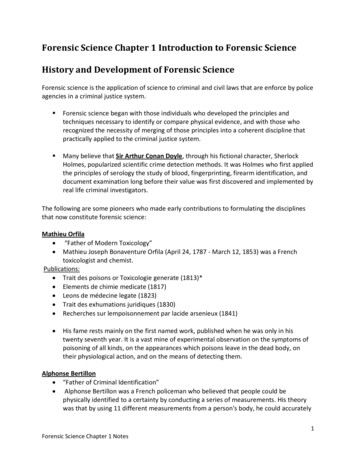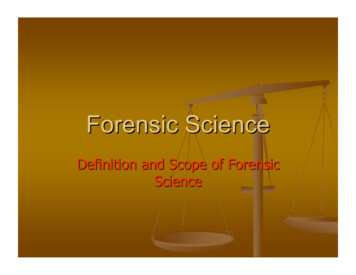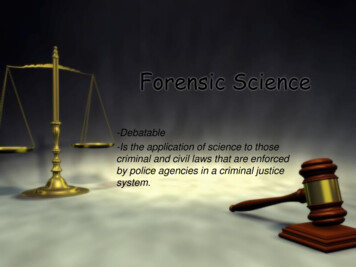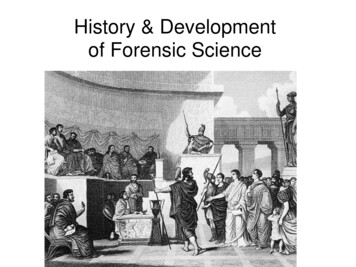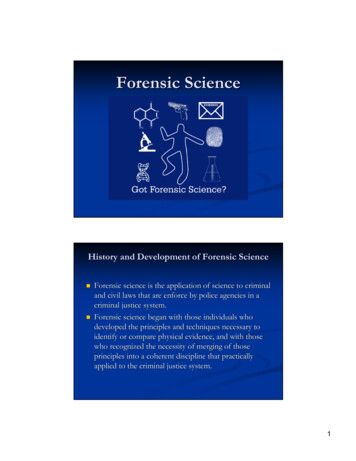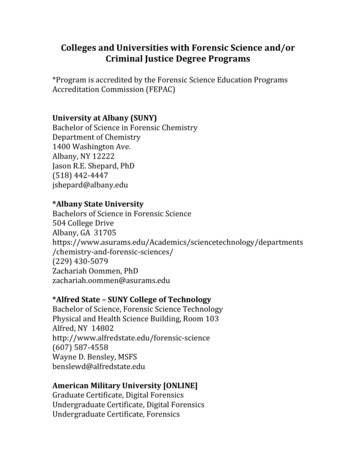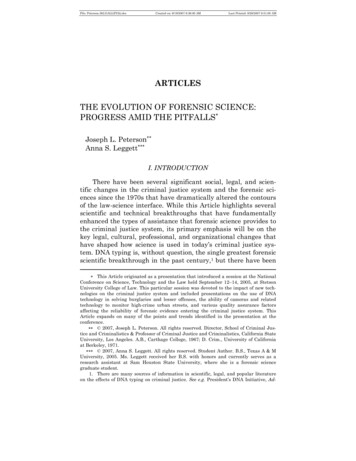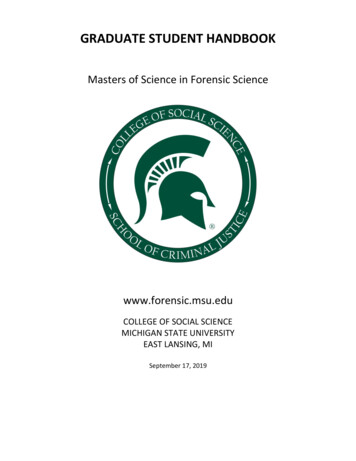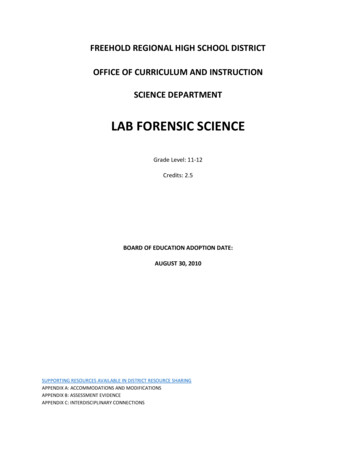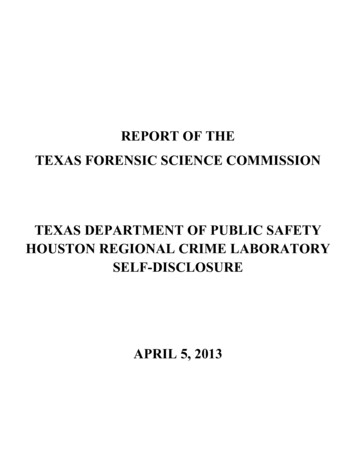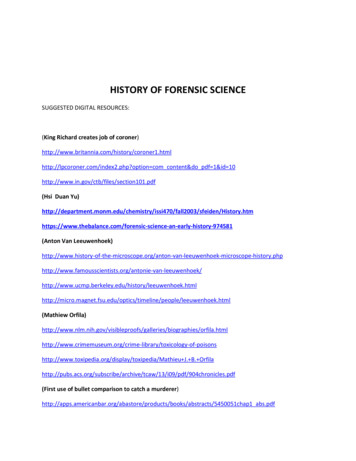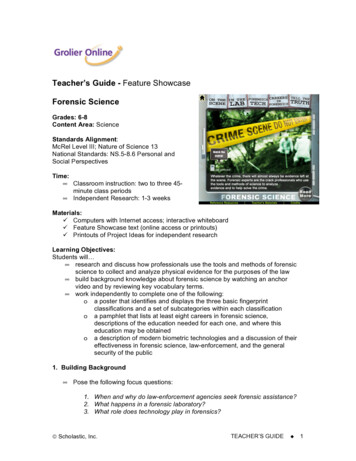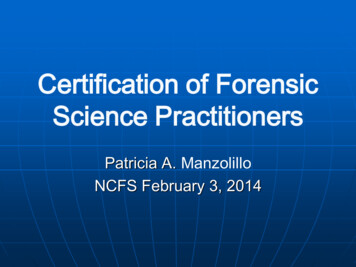
Transcription
Certification of ForensicScience PractitionersPatricia A. ManzolilloNCFS February 3, 2014
Certification of Forensic SciencePractitioners One of the 13 recommendations from theNational Academy of Sciences (NAS) reportcalled for mandatory certification of forensicscience professionals and includedrecommended minimum requirements forcertification.Accreditation is for the forensic science providerCertification is for the individual practitioner
Certification of Forensic SciencePractitionersWhat is Certification? Professional certification is the recognition by anindependent body that an individual has acquired anddemonstrated specialized knowledge, skills, and abilitiesin the standard practices necessary to execute the dutiesof their profession.Certification provides the general public and the judicialsystem a means of identifying those practitioners whohave successfully demonstrated compliance withestablished requirements.
Certification of Forensic SciencePractitionersWhat is Certification? Certification ensures that professionals maintaintechnical proficiency and ethical standards of practice.Professional certification programs can include: writtenand/or practical testing; an evaluation of education,training and practical experience; requirements forcontinuing education; and adherence to a code of ethics.
Certification of Forensic SciencePractitionersWhat certification programs exist in forensicscience? Are the programs standardized? Who accredits the certification programproviders? What certification organizations andprograms are needed to fill identified gaps incertification?
Certification of Forensic SciencePractitionersWho should be certified? What are minimum requirements forbeginning a certification process? What are requirements for maintenanceand continued professional development? Should certification become mandatory or acondition of employment? What are the differences betweencertification, licensure, credentialing,certificate programs and registration?
Certification of Forensic SciencePractitionersUniversal adoption and compliance What economic and organizational frameworkexists for certification? Can the current structure support newdevelopments and requirements, and potentialuniversal compliance to strengthen the forensicsciences?PersonnelFundingFacilities
Certification of Forensic SciencePractitioners Professional certification bodies in forensicscience have been in practice for over thirtyyears. However, they do not exist for all forensicscience categories of testing.There are specialty and subspecialty categoriesof testing that do not have certification bodiesdue to the very small number of practitioners. Itis recognized in the certification community thatit is difficult to create a certification program withless than fifty practitioners.
Certification of Forensic SciencePractitioners The existing certification bodies differ in thecertification examination processes andessential elements of the programs but it may beappropriate depending on the category oftesting.There are many unknown variables, such as thenumber of practitioners that are not currentlycertified, the costs associated with developingcertification examinations and programs, and thecost for the certification bodies to becomeaccredited.
Variations in the Requirements of Three Accredited Certifying Bodies itten exam (initial)XXXPractical exam (initial)XXXOral demonstration (initial)X*Continuing educationXRetestingX*Transcript or moot courtX XX Specific to practicalexam
Certification of Forensic SciencePractitioners The Forensic Specialties Accreditation Board (FSAB) avoluntary program since 2000 to assess, recognize andmonitor forensic science certification bodies. FSABreviews and evaluates the operating procedures andstandards of forensic certification bodies to ensure that aminimum set of standards are being met. FSABstandards are modeled on ISO/IEC 17024; as of 2012,they were not recognized by a third party or accreditedunder ISO/IEC 17011.American National Standards Institute (ANSI) is anaccrediting body recognized by ISO/IEC 17011 thatoffers accreditation under ISO/IEC 17024. Accreditationunder ISO/IEC 17024 ensures the validity, reliability andquality of the certification programs.
Certification of Forensic SciencePractitionersThe confirmation of qualifications such as licensure,credentialing, certificate programs and registration are not usedin the forensic sciences primarily due to their limited scope orspecific nature.Licensure is a mandatory process used by a governmental agency whichgrants a time-limited permission for an individual to perform the duties of theirprofession after verifying that this individual has met specific standardizedcriteria. Registration is a process in which a governmental agency grants a timelimited status on a registry, determined by specified knowledge-basedrequirements such as experience, education or examinations. Theregistration is similar to licensure, but also maintains a continuous record ofpast and current occupational status of the individual.
Certification of Forensic SciencePractitionersCredentialing by an authorized and qualified entity is theformal recognition or recording of the recognition status ofindividuals, organizations, institutions, programs, processes,services or products that meet specific standardized criteria. Certificate programs are learning events developed andadministered by the certificate issuer. A certificate is presentedat the end of a training course as recognition of specific skills.Unlike certification programs, these certificates do not haverenewal requirements and cannot be revoked.
Certification of Forensic SciencePractitionersPractitioners should become certified in all categories of testing in whichexaminations are performed as soon as the requirements of the certification bodyare met, provided a certification examination is available. Includes all federal, state and local government, private and part-timepractitioners. Certification should be appropriate to the responsibility, activity or functionperformed Certification should include multiple levels based upon the responsibilities ofthe forensic science practitioner to include managers, analysts and technicalsupport. Certification processes should include basic levels for practitioners who do notyet meet the requirements of a specialty certification body or for practitionersconducting examinations in categories of testing that do not have a certificationprocess.
Certification of Forensic SciencePractitionersCertification bodies should collaborate to develop uniform requirements. Programs should include these essential elements: education andexperience requirements, proctored written examination, a practicalcomponent, and a code of ethics/conduct. Recertification should include continuing education and periodic retestingwith practical and written components.Forensic Science Service Providers should include certification requirements inposition descriptions, where possible.Accrediting bodies should include standards requiring certification. Incorporate a confirmation of qualifications review of the individualpractitioners into the forensic science service providers’ ISO/IEC 17025accreditation process. Review the competency and proficiency of all non-certified practitioners aspart of the accreditation process.
Certification of Forensic SciencePractitionersConsiderationsImplementation – How do we do this?Timeframe – What is reasonable?Costs/Budget – How do we pay for it? This is unknown due to scope.Stakeholder education – How do we identify and reach out?Current state laws – Contract or union issues?Specialty and sub-specialty examinations – How do we address these?
Certification of Forensic SciencePractitionersConsiderationsPractitioners would be required to obtain multiple certifications for differentcategories of testing in which they perform examinations. This may be difficult toaccomplish due to time and cost constraints and may result in a loss of expertisein certain areas.In specialized categories of forensic science testing which have a small numberof practitioners, other similar specialized experienced scientists, researchers,and academicians would be needed to assist in development of examinations.There may be human resource challenges such as revising position descriptions,certifying existing employees, and modifying employment policies andprocedures.Forensic science service providers may incur increased costs to support andmaintain certification of practitioners and would need policies and procedures ifpractitioners are not successful in obtaining certification.
Certification of Forensic SciencePractitionersOther data Data on the certification bodies in forensic science categoriesof testing as of Dec 2011. Cost estimate for certification and related activities basedupon information from certifying bodies. A compilation of the certification processes available inMedicolegal Death Investigation and Pathology.
Interagency Working Group - Accreditation & CertificationResourcesAmerican Board of CriminalisticsAmerican Board of Medical Death InvestigatorsNational Association of Medical ExaminersAmerican Board of Forensic ToxicologistsInternational Association of Computer ISInternational Association of IdentificationForensic Specialties Accreditation BoardAmerican National Standards InstituteASTM (Certificate and Certification Programs)Institute for Credentialing ExcellenceIdaho State Laboratory (mandatory certification program)American Society for Clinical Pathology Board of CertificationAmerican Society for Quality Certification
Interagency Working Group - Accreditation & CertificationResourcesBureau of Justice Statistics (Census)Statistical Counseling (ISO17043)Uniform Law CommissionNational Council of State LegislatorsAmerican Judges AssociationSenator Leahy & Judiciary Committee
May 13, 2014 · Certification of Forensic Science Practitioners What is Certification? Certification ensures that professionals maintain technical proficiency and ethical standards of practice. Professional certification programs can include: written and/or practical testing; an evaluation of education,
